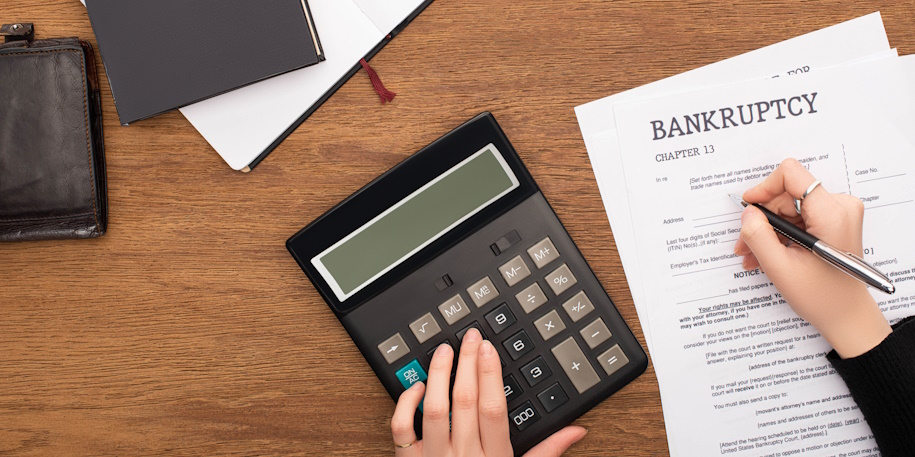How Non-Consumer Debt Through My Small Business and Taxes Helps You Qualify for Chapter 7
Business owners with personal and business debt often seek out a bankruptcy attorney for help, only to hear the unfortunate words: “You’re personally liable for your business debt, and you make too much money to pass the means test in your state. You’ll have to pay most or even all of your debt in a Chapter 13 bankruptcy because of your income.”
However, there may be more to the story that the client and bankruptcy lawyer haven’t explored. In particular, there may be a way for business owners and those with tax debt to sidestep the means test, even if they’re bringing in much more money than the household median income and don’t pass the Chapter 7 means test.
Keep reading to see what is possible for small business owners and those with significant tax debt.
It All Comes Down to Consumer Versus Non-Consumer Debt
Before we explain whether business debt is eligible for discharge in Chapter 7 bankruptcy, it is important to define consumer and non-consumer debt:
- Consumer debt: According to Section 101(8) of the Bankruptcy Code, consumer debt is taken on for a “personal, family, or household purpose” such as medical bills, credit cards, your mortgage, or student loans.
- Non-consumer debt: You take on this form of debt for business purposes, including your business lease or debt from payments that are legally required by both households and businesses, such as your taxes.
Understanding these definitions is the first step to potentially getting your debt discharged through Chapter 7, even if your median household income appears to be too high at first glance.
Why Your Non-Consumer Debt Might Make You Eligible for Bankruptcy
Knowing how much consumer and non-consumer debt you have is a useful tool for a well-versed bankruptcy attorney. With this information, they can help you navigate the legal technicalities to help you cancel out your debt without having to pass the means test.
You can leverage your business debt and tax debt to your advantage when filing for bankruptcy with a lawyer. The American Bankruptcy Institute explains that the means test to determine your eligibility for Chapter 7 bankruptcy is primarily required for consumer debt. However, notice that the Bankruptcy Code uses an important qualifier that has been interpreted by the courts to benefit business and tax debtors: “primarily.”
This “primarily” is the key to unlocking a benefit for people with non-consumer debt. Primarily means that if more than 50% of your debts are tax debt and or related to your small business (as opposed to consumer debt) the debtor does not need to pass the means test to qualify for Chapter 7. Although mounting debt is a less than perfect circumstance, certain ideal conditions allow you to file for Chapter 7 bankruptcy because of your non-consumer debt.
When evaluating whether you are primarily a non-consumer debtor, it is important to know that your mortgage, car loans, and student loans are all considered consumer debt. This can create a substantial hurdle to qualifying as a primarily non-consumer debtor. Still, it is possible to qualify if you have enough business debt and or tax debt, or don’t have a mortgage or student loans.
These debts may include:
- Overdue business lease payments, as well as the remaining payments due on a lease if your business has already broken it.
- Business loans.
- Merchant cash advance (MCA) loans.
- Franchisee debt.
- Small Business Association (SBA) Economic Injury Disaster Loans (EIDL).
- Unpaid taxes.
For those who have been struggling with business debt but aren’t sure that Chapter 13 bankruptcy or a lump sum debt settlement is a cost-effective solution, the ability to pass the means test is a powerful advantage to help you to put your financial stress behind you.
And if you qualify for Chapter 7 bankruptcy as a non-consumer debtor, your consumer debt such as personal credit cards and medical bills are still dischargeable!
However, it is important to remember that the expertise of a bankruptcy lawyer is necessary to ensure your circumstances match the legal requirements for sidestepping the means test.
Find an Experienced Attorney Who Understands the Advantages Available Through Bankruptcy Law
Bankruptcy attorneys are not made equally, and you can’t expect every lawyer to understand the complexities of your business and personal debt. Finding the right bankruptcy lawyer is your first step to ensure you can take advantage of Chapter 7 for your non-consumer business and tax debt.
Consider a bankruptcy lawyer near you who has a significant depth of experience with:
- Chapter 7 bankruptcy.
- Chapter 13 bankruptcy.
- Small business bankruptcy and debt settlement.
- SBA and EIDL loans.
- Tax debt.
Years of experience with personal and business bankruptcy and debt relief demonstrate that the lawyer you’ve chosen has likely helped clients in your shoes achieve beneficial legal outcomes for their debt struggles.
Related Reading About Business Bankruptcy
Learn more effective solutions for handling small business debt and tax debt by exploring these articles:

